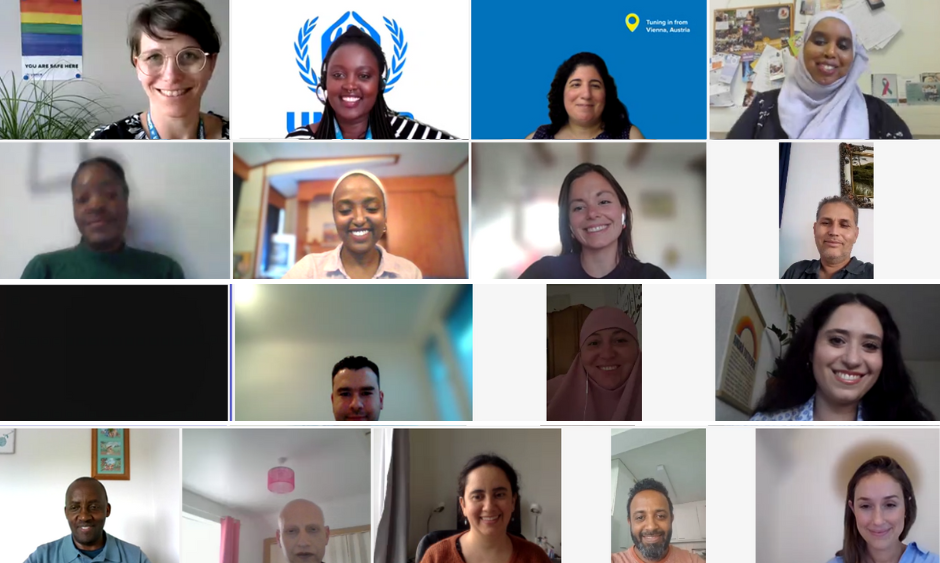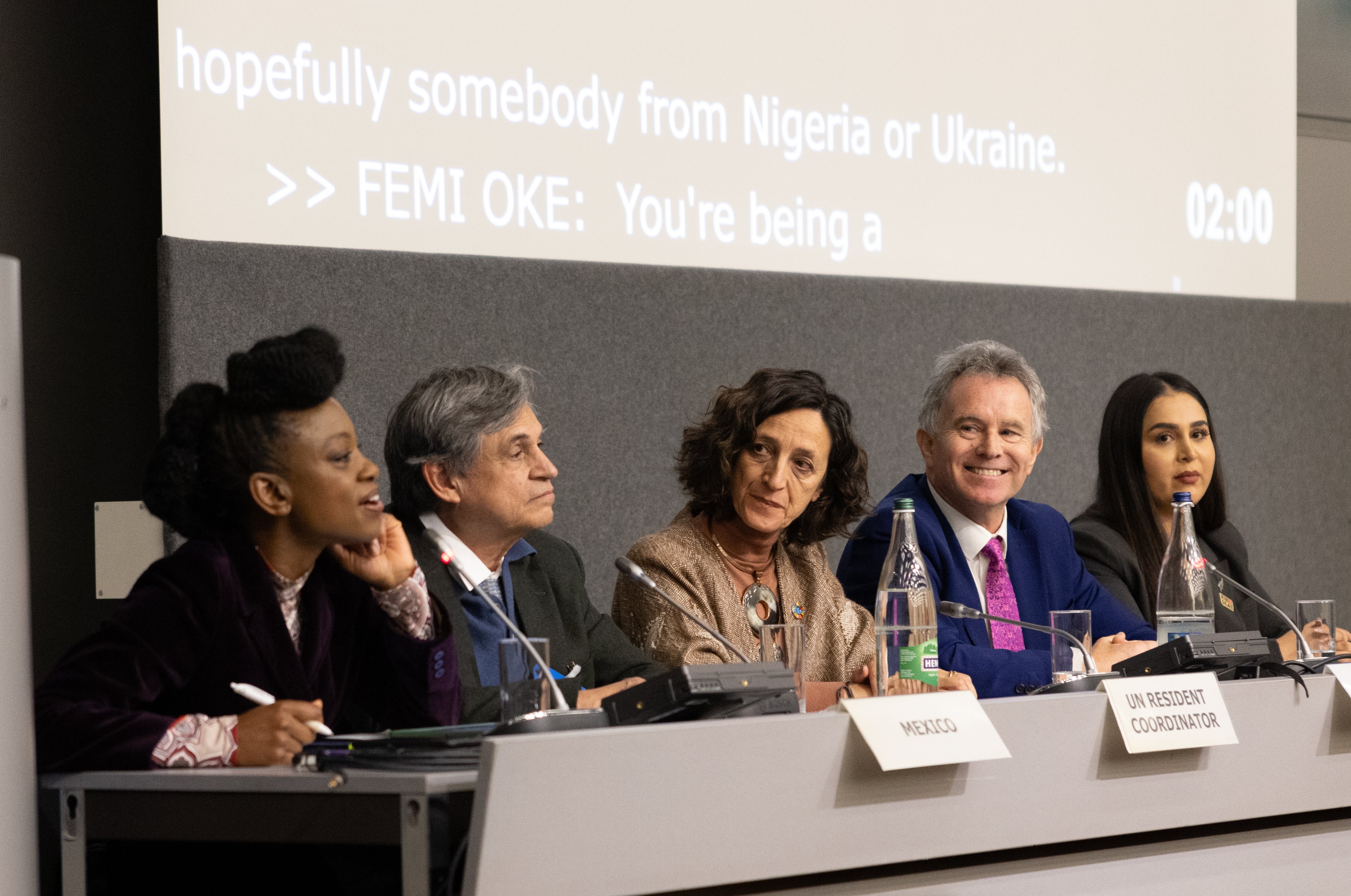UNHCR's Priorities for the next Irish Government
UNHCR's Priorities for the next Irish Government
In recent years, the government has streamlined the application process for asylum-seekers and introduced a number of improvements to the direct provision system as recommended by the 2015 McMahon report. However, work remains to be done in a number of key areas.
UNHCR has six calls to the next government to better protect refugees

Continue improvements to Direct Provision including the application process
Since 2017, a new streamlined application process has reduced the time it takes to assess applications for asylum significantly. However, more needs to be done to reduce waiting times further and to prevent future backlogs.
UNHCR calls on the next government to:
- Establish an independent inspectorate to monitor standards in direct provision centres and emergency accommodation.
- Ensure that adequate vulnerability assessments are in place for all international protection applicants, as well as adequate referral and support structures, to ensure the individual and particular reception needs of vulnerable persons are met.
- Establish a robust contingency planning framework to anticipate increases in the number of asylum applications, periodic fluctuations and capacity pressures and to take proactive measures to prevent backlogs in processing applications.
End emergency accommodation
There are 6,013 people living in 40 direct provision centres across the country (as of Dec 2019). An additional 37 hostels and hotels are being used as emergency accommodation to house a further 1,559 people. The government spent almost €30 million on the provision of this emergency accommodation between January and November last year.
Not only does emergency accommodation represent poor value for money, those living in emergency accommodation can sometimes struggle to access basic services including timely access to medical services and information on their rights.
UNHCR therefore urges the next government to:
- Phase out the use of emergency accommodation for international protection applicants as soon as possible in 2020;
- Cut waiting times for applications from 15 months to at a maximum 9 months.

Combat hate crime & hate speech
The particular vulnerability of asylum-seekers and refugees to racist and xenophobic attitudes and acts is an ongoing issue that needs to be addressed.
In November 2019, Ireland appeared before the UN Committee on the Elimination of Racial Discrimination (CERD), which expressed concern over the increasing incidence of racist hate speech and hate crime directed at refugees, asylum-seekers and migrants. The Committee recommended the adoption of a new National Action Plan Against Racism to address identified gaps in the existing anti-racial discrimination policy and institutional framework.
UNHCR welcomes the government’s timely decision to review the Incitement to Hatred Act 1989 and initiate a public consultation on the subject of hate crime. UNHCR urges the next government to:
- Strengthen its legislation on hate crime and hate speech, given the more frequent occurrence of hate crime and the growing prevalence of hate speech, particularly online and on social media.
Better support refugee integration
The formation of lasting policy rather than quick-fix solutions for refugees and asylum-seekers is of great importance. The current Migrant Integration Strategy focuses on a mainstreaming approach without any consideration of the specific situation or needs of asylum seekers and refugees. Integration is a fundamental aspect of the experiences of refugees and asylum-seekers.
In order to both facilitate those communities who are eager to support refugees and asylum-seekers in their community and to create opportunities for refugees and asylum-seekers to integrate, government support must be provided on a long-term basis. UNHCR recommends that:
- A permanent structure for integration be put in place at a local authority level, with dedicated funding streams and effective coordination and monitoring mechanisms tied to national policies and structures;
- The waiting time for asylum seekers to access the labour market be reduced from 9 months to 6 months in order to promote faster economic and social integration.

Opt-in fully to the Common European Asylum System
The Common European Asylum System (CEAS) sets down minimum procedural standards in the area of refugee protection. It aims to strengthen cooperation between member states and determine more fairly and effectively which EU member state is responsible for processing asylum claims.
Although Ireland has opted into several European instruments in the area of asylum, it is not bound by the recast Asylum Qualification Directive (2011/95/EU) or the recast Asylum Procedures Directive (2013/32/EU). By fully opting into the CEAS, Ireland will join other EU member states in strengthening procedures and granting uniform status for those granted asylum. It will also make it easier for Ireland to show solidarity with countries such as Greece, who continue to receive the majority of refugees in the EU, by welcoming some of those people here. Ireland should therefore:
- Fully opt into the Common European Asylum System.
- Continue to demonstrate solidarity with other member states through participation in European search and rescue, disembarkation and relocation programmes.
Respond to refugee crises abroad
The vast majority of the world’s refugees (85%) live in the developing world. After a decade in which the number of displaced persons has reached record highs, supporting them and the countries who host them has never been more important. Ireland’s commitment to spending 0.7% of GNI by 2030 in official development assistance, and its aim of targeting the furthest behind first, is an important expression of support for those forced to flee their homes because of war, conflict and persecution.
Resettlement is a vital protection tool that protects the most at risk refugees. However, of the world's 26 million refugees, only a very small number will ever be resettled. Of the estimated 1.2 million refugees identified as being in need of resettlement in 2018, only 55,692 were actually resettled.
Ireland’s continued support for the resettlement programme ensures that those refugees facing heightened risks are protected. Ireland’s pledge to increase resettlement by 20% over the next four years is a very significant contribution, one that is urgently needed given the record number of people fleeing from war, conflict and persecution.
UNHCR calls on the next government to:
- Commit to annual increases in official development assistance spending in order to fulfil the commitment to spend 0.7% of GNI on official development assistance by 2030;
- Implement current commitments to resettle refugees to Ireland and continue its support for refugees facing urgent protection risks abroad.





